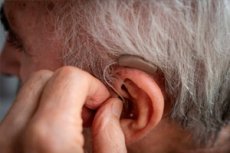New publications
Hearing aids reduce the development of dementia
Last reviewed: 29.06.2025

All iLive content is medically reviewed or fact checked to ensure as much factual accuracy as possible.
We have strict sourcing guidelines and only link to reputable media sites, academic research institutions and, whenever possible, medically peer reviewed studies. Note that the numbers in parentheses ([1], [2], etc.) are clickable links to these studies.
If you feel that any of our content is inaccurate, out-of-date, or otherwise questionable, please select it and press Ctrl + Enter.

The use of hearing aids significantly reduces the risk of dementia in hard of hearing elderly people. A study on this topic was recently conducted by Danish scientists.
Age-related hearing loss acts as one of the unfavorable factors contributing to the development of dementia in the elderly. Nevertheless, this statement required more solid evidence, scientific tracing of all causal links in the pathogenetic chain. The experts set themselves the goal of studying the relationship between the deterioration of hearing capabilities and the development of dementia, as well as the possible impact of hearing aids on the prevention of this disorder.
A group of scientists have thoroughly analyzed the existing informative database of otolaryngology patients from Southern Denmark who have had their hearing function examined at various times. In total, medical data on hearing quality were collected from more than 570,000 people with an age range of 50 years or more.
In the course of studying selected information, experts found that hard-of-hearing elderly people who did not use hearing aids in their normal lives had an increased risk of developing dementia.
To date, more than 55 million cases of dementia have been diagnosed worldwide. More than half of these patients live in low-income regions. About 10 million new cases are diagnosed each year.
Dementia is the result of pathological or traumatic brain damage. The most common form of the disorder is Alzheimer's disease.
Dementia is the seventh most frequent cause of death in the world, and is also the main cause of disability of elderly patients, loss of self-care.
There is still no effective treatment for dementia. Therapy is aimed at comprehensive support of patients with this disease, improving their quality of life and level of well-being. Most medical professionals agree that the disease is easier to prevent, so it is important to think about preventing the disorder before it occurs. In many cases, the use of a suitable hearing amplification device can help to slow cognitive decline and return the brain to its usual workload: the person is able to understand speech and communicate freely again, which has a positive effect on brain activity.
The results of the scientific analysis made it clear that the use of hearing aids can, if not prevent, then significantly delay the onset and worsening of dementia in elderly patients.
Details are described in the scientific journal jAMA Network
